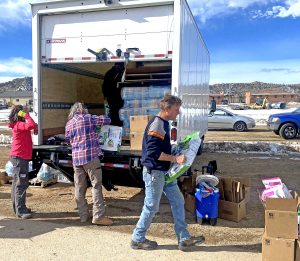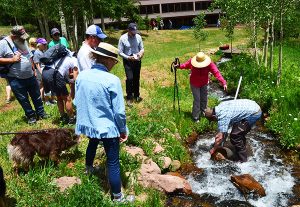by Bob Kennemer
HUERFANO- Over the past 15 years or so the Huerfano County region has seen a variety of issues, which had they materialized, could have had both local and widespread negative impacts on our quality of life. This is such a story.
Although the following issue is not a traditional environmental issue, per se, it had the potential to change life in Las Animas and Huerfano counties significantly. Around 1995, a proposal allowing limited stakes gambling to expand into Huerfano and Las Animas counties managed to get a place on the ballot as a state wide voter initiative. In 1990 limited stakes gambling had been legalized in the three historic mountain towns of Cripple Creek, Blackhawk, and Central City resulting in a meteoric rise in property values. Jobs were abundant. The communities saw their economies soar. State coffers began to swell. All was good. Or was it?
Before the new jobs came, most of the existing jobs were lost. Rents went to an all time high. Many residents had to move away. By 1996 the dust settled enough to allow for some research on what happens to a town, when gaming takes over. Patrick T. Long of the University of Colorado Boulder Tourism Management Program, College of Business and Administration wrote, “An unbridled move to a gambling economy causes tremendous change and the need for dramatic adjustment in the lives of community residents.”
Yes, the new gaming economy brought prosperity, however it also totally changed the nature of the communities noted above. But the appeal proved strong, especially in Trinidad and Walsenburg. A well organized group of citizens worked hard to sell the idea to both local residents and throughout the state. The issue would be decided by all of Colorado’s voters, not just the two counties involved.
With Trinidad and Walsenburg appearing to be in strong support of gaming and a well funded campaign supported by the gaming industry, it appeared that the opposition simply could not win. But soon, those who had witnessed how gambling had changed their communities came forth with stories of how the experiment had gone horribly astray. What had been billed as a way to boost local economies and to help with historic preservation, had turned in a monstrous nightmare!
Elderly people had been forced to move out of their homes because they couldn’t afford the increased property taxes. Basic services like laundromats and gas stations could no longer afford to operate. Workers had to commute huge distances because they could not pay the new high rents. Even the mayor of Central City, who had supported the gaming initiative, reversed his stance once he saw the unexpected devastation.
Most of the citizens of La Veta opposed the gaming idea. Although the town could prohibit gaming in town limits, the casinos could go in right outside of town. La Veta could have all of the negative impacts and none of the economic benefits. The La Veta town board came out against the gaming proposal. Local activists held protests and collected signatures from citizens and businesses opposed to the ballot initiative. Floats were seen in the 4th of July and Ft. Francisco Day parades showing people in long underwear or wearing nothing but a barrel because they had “Lost it all to gambling!”
Amazingly, the ballot proposal was defeated! Apparently, the citizens of Colorado heard the cry from those regretful souls in Central City, Blackhawk, and Cripple Creek. Sure some in those towns had made a fortune. Their population exploded. Their economies became bloated. But all they once had treasured was gone. They had, “Lost it all to gambling!”




